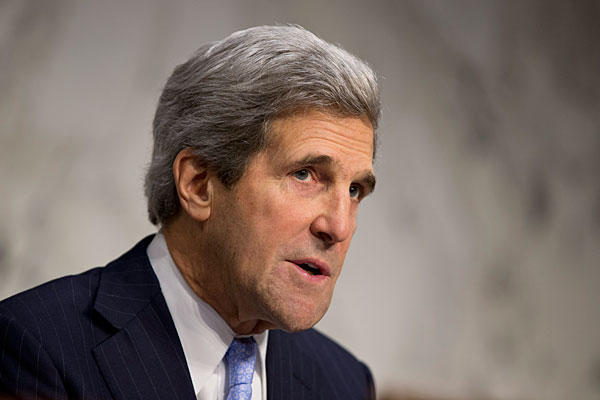WASHINGTON (AP) — Secretary of State John Kerry says chemical weapons were used in Syria and is accusing President Bashar Assad of destroying evidence.
Videos by Rare
Ratcheting up criticism of Syria’s alleged chemical weapons use, Kerry called last week’s attack a “moral obscenity” that should shock the conscience of the world.
He says the U.S. has additional information about the attack and will make it public in the days ahead.
Kerry says shelling the affected area afterward was not the action of a government trying to cooperate with U.N. investigators trying to assess what happened.
The alleged chemical weapons attack on Aug. 21 that killed hundreds has moved the U.S. closer to military action against Syria than at any point during the bloody civil war.
Syrian President Bashar Assad has denied launching a chemical attack.
THIS IS A BREAKING NEWS UPDATE. Check back soon for further information. AP’s earlier story is below.
The Obama administration was expected Monday to toughen its criticism of Syria’s alleged chemical weapons use, with Secretary of State John Kerry cutting his vacation short to address the crisis as the U.S. considers possible military actions.
Kerry was scheduled to deliver a statement from the State Department at 2 p.m. EDT. His planned remarks come hours after a United Nations team on the ground in Syria came under attack while heading to investigate last week’s purported use of deadly gases by President Bashar Assad’s regime.
U.S. officials say the investigation is largely meaningless because the Syrian government did not authorize it until evidence was likely destroyed by shelling late last week. Even without the investigation, officials say they have “very little doubt” that chemical weapons were used, based in part on the number of reported victims, the symptoms of those injured or killed and witness accounts.
The alleged chemical weapons attack has moved the United States closer to military action against Syria than at any point during the bloody civil war. But the Obama administration and international allies appear narrowly focused on a response that would punish Assad for deploying deadly gases, not sweeping actions aimed at ousting Assad or strengthening rebel forces.
The focus of the internal debate underscores the scant international appetite for a large-scale deployment of forces in Syria and the limited number of other options that could significantly change the trajectory of the conflict.
U.S. and Western European officials were working to build an international consensus around the eventual response. British Prime Minister David Cameron, who also cut short his vacation, spoke Monday with Russian President Vladimir Putin, whose government has continued to support Assad throughout the civil war.
“The prime minister made clear that there was little doubt that this was an attack carried out by the Syrian regime,” a Cameron spokesman said. “There was no evidence to suggest that the opposition had the capability to carry out such a significant attack and the regime had launched a heavy offensive in the area in the days before and after the incident.”
Russian officials say there is no proof that the Syrian government is behind last week’s attack.
Cameron’s office said the British government would decide on Tuesday whether the timetable for the international response means it will be necessary to recall lawmakers to Parliament before their scheduled return next week. That decision could offer the clearest indication of how quickly the U.S. and allies plan to respond.
More than 100,000 people have died in clashes between forces loyal to Assad and rebels trying to oust him from power over the past two and a half years. While President Barack Obama has repeatedly called for Assad to leave power, he has resisted calls for a robust U.S. intervention, and has largely limited American assistance to humanitarian aid. However, Obama said last year that chemical weapons use would cross a “red line” and would likely change his calculus in deciding on a U.S. response.
But last week’s attack in the Damascus suburbs is a challenge to Obama’s credibility. He took little action after Assad used chemical weapons on a small scale earlier this year and risks signaling to countries like Iran that his administration does not follow through on its warnings.
Syrian activists say the Aug. 21 attack killed hundreds; the group Doctors Without Borders put the death toll at 355 people. Assad has denied launching a chemical attack.
It’s unlikely that the U.S. would launch a strike against Syria while the United Nations team is still in the country. The administration may also try to time a strike around Obama’s travel schedule – he’s due to hold meetings in Sweden and Russia next week – in order to avoid having the commander in chief abroad when the U.S. launches military action.
What remains unclear is whether the U.S. will seek some sort of clearance from the U.N. before using force. While it’s likely Russia and China would block the U.S. at the U.N. Security Council, Obama last week spoke of the risks of proceeding without international backing.
“If the U.S. goes in and attacks another country without a U.N. mandate and without clear evidence that can be presented, then there are questions in terms of whether international law supports it – do we have the coalition to make it work?” Obama said. “Those are considerations that we have to take into account.”
U.N. Secretary-General Ban Ki-moon on Monday countered the U.S. claim that the investigation at the site of last week’s attack was too little, too late.
“Despite the passage of a number of days, the secretary-general is confident that the team will be able to obtain and analyze evidence relevant for its investigation of the August 21 incident,” U.N. spokesman Farhan Haq said in New York
The president pressed on Monday with several events unrelated to Syria, including a Medal of Honor ceremony for an Afghan war veteran and a meeting with faith leaders about this week’s 50th anniversary of the March on Washington. But all around him, there were signs that Washington and the international community were ramping up for some type of response.
Kerry returned to Washington on Sunday night so he could attend Syria deliberations in person. The secretary, who spent the weekend making phone calls to various world leaders, had participated in Syria meetings at the White House last week by secure audio and video link. He had not been due to return to work until after Labor Day.



